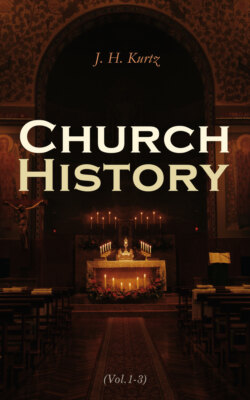Читать книгу Church History (Vol.1-3) - J. H. Kurtz - Страница 14
На сайте Литреса книга снята с продажи.
§ 10. Intercourse between Judaism and Heathenism.
ОглавлениеAlexander the Great’s conquest of the world brought into connection with one another the most diverse elements of culture in antiquity. Least of all could Judaism outside of Palestine, the diaspora, living amid the influences of heathen or Hellenic culture and ways of viewing things, withdraw itself from the syncretic current of the age. The Jews of Eastern Asia maintained a closer connection and spiritual affinity with the exclusive Palestinian Rabbinism, and the heathen element, which here penetrated into their religious conceptions, became, chiefly through the Talmud, the common property of post-Christian Judaism. But heathenism also, contemptible as Judaism appeared to it, was susceptible to Jewish influences, impressed by the deeper religious contents of Judaism, and though only sporadic, instances of such influence were by no means rare.
§ 10.1. Influence of Heathenism upon Judaism.—This reached its greatest strength in Egypt, the special centre and source of the syncretic tendencies of the age. Forming for itself by means of the adoption of Greek culture and especially of the Platonic philosophy a more universal basis of culture, Jewish Hellenism flourished in Alexandria. After Aristobulus, who wrote Ἐξηγήσεις τῆς Μωυσέως, about B.C. 170, now only found in a fragment of doubtful authority, and the author of the Book of Wisdom, the chief representative of this tendency was the Alexandrian Jew Philo, a contemporary of Christ. His Platonism enriched by elements drawn from Old Testament revelation and from the doctrines of the Essenes has on many points carried its speculation to the very borders of Christianity, and has formed a scaffolding for the Christian philosophy of the Church Fathers. He taught that all nations have received a share of divine truth, but that the actual founder and father of all true philosophy was Moses, whose legislation and teaching formed the source of information for even the Greek Philosophy and Mysteriosophy. But it is only by means of allegorical interpretation that such depths can be discovered. God is τὸ ὄν, matter τὸ μὴ ὄν. An intermediate world, corresponding to the Platonic world of ideas, is the κόσμος νοητός, consisting of innumerable spirits and powers, angels and souls of men, but bound together into a unity in and issuing from the Word of God, who as the λόγος ἐνδιαθετός was embraced in God from eternity, coming forth from God as the λόγος προφορικός for the creation of the world (thought and word). The visible world, on account of the physical impotence of matter, is an imperfect representation of the κόσμος νοητός, etc. On the ground of the writing De vita contemplativa attributed to Philo, the Therapeutæ, or worshippers of God, mentioned therein, had been regarded as a contemplative ascetic sect related to the Essenes, affected by an Alexandrian philosophical spirit, living a sort of monastic life in the neighbourhood of Alexandria, until Lucius (Strassb., 1879) withdrew them from the domain of history to that of Utopian romance conceived in support of a special theory. This scholar has proved that the writing referred to cannot possibly be assigned to Philo, but must have been composed about the end of the third century in the interest of Christian monasticism, for which it presented an idealizing apology. This, however, has been contested by Weingarten, in Herzog, x. 761, on good grounds, and the origin of the book has been assigned to a period soon after Philo, when Hellenistic Judaism was subjected to a great variety of religious and philosophical influences.5
§ 10.2. Influence of Judaism upon Heathenism.—The heathen state showed itself generally tolerant toward Judaism. Alexander the Great and his successors, the Ptolemies, to some extent also the Seleucidæ, allowed the Jews the free exercise of their religion and various privileges, while the Romans allowed Judaism to rank as a religio licita. Nevertheless the Jews were universally despised and hated. Tacitus calls them despectissima pars servientium, teterrima gens; and even the better class of writers, such as Manetho, Justin, Tacitus, gave currency to the most absurd stories and malicious calumnies against them. In opposition to these the Jewish historian Flavius Josephus took pains to overcome the prejudices of Greeks and Romans against his nation, by presenting to them its history and institutions in the most favourable light. But on the other side, the Greek translation of the Old Testament, called the Septuagint, as well as the multitude of Jewish synagogues, which during the Roman period were scattered over the whole world, afforded to every heathen interested therein the opportunity of discovering by personal examination and inquiry the characteristic principles of Judaism. When, therefore, we consider the utterly corrupt condition of heathenism, we cannot wonder that Judaism, in spite of all the contempt that was thrown upon it, would attract, by reason of its hoary antiquity and the sublime simplicity of its creed, the significance of its worship, and its Messianic promises, many of the better aspiring heathens, who were no longer satisfied with their sorely degraded forms of religion. And though indeed only a few enrolled themselves as “Proselytes of Righteousness,” entering the Jewish community by submitting to the rite of circumcision, the number of the “Proselytes of the Gate” who without observing the whole of the ceremonial law undertook to abandon their idols and to worship Jehovah, in all ranks of society, mostly women, was very considerable, and it was just among them that Christianity found the most hearty and friendly acceptance.
